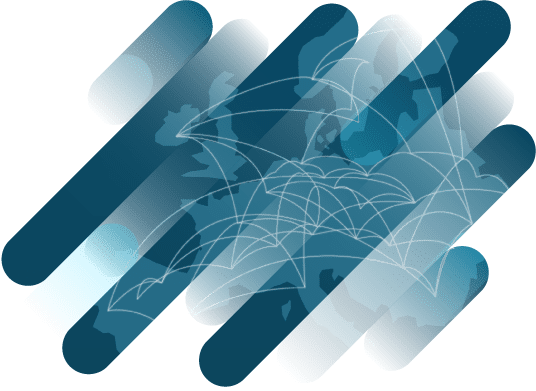Discover how Myra combines digital sovereignty and cyber resilience.
Home>
GAIA-X
03
Where will GAIA-X be used?
In the long term, GAIA-X will primarily be used to promote practical solutions in the eight areas of Industry 4.0, smart living, finance, geoinformation, healthcare, the public sector, mobility, agriculture and energy. This is clear from the GAIA-X use cases that have already been identified. One concrete case study, for example, describes the use of the data platform for sustainable finance based on artificial intelligence (AI) and machine learning. It would also be conceivable to use GAIA-X as a framework for the secure exchange of healthcare data to improve patient care. In the transportation sector, the project could enable optimized maintenance solutions based on predictive maintenance, among other things. Intelligent algorithms calculate when and where maintenance work needs to be carried out on the transport infrastructure in line with demand. For these and many other areas of application, an open data platform based on European standards offers enormous advantages.
04
GAIA-X will score with these strengths
ACTIVELY SHAPING PROGRESS & INNOVATION IN THE CLOUD
Cloud computing has become an indispensable part of our modern society. Technology enables companies to provide data and services in real time to millions of users. Modern collaborative working on documents, video conferencing, online banking or even streaming music and movies would be inconceivable without the cloud. According to the Bitkom study "Cloud Monitor 2022", 84% of companies with at least 20 employees already use cloud computing.
According to a survey by Sopra Steria, the main arguments in favor of the technology are its high scalability, mobile access to operational resources, and the ability to innovate through technologies such as AI or big data analytics. Due to the constant digitalization of the financial industry, healthcare, critical utilities and many other sectors, more and more processes are migrating to the cloud - and this creates dependencies.
BREAKING THROUGH ONE-SIDED MARKET DOMINANCE
The cloud market is currently largely dominated by a few global hyperscalers. Especially in exceptional situations such as the Corona pandemic, digital sovereignty and autonomy are crucial factors in overcoming the crisis. During the pandemic, numerous enterprises and other organizations were forced to rely on cloud solutions for the sake of business continuity, which were incompatible with applicable IT security and privacy compliance requirements. Requirement-compliant alternatives from on-premises vendors were very much available but were often ignored due to existing vendor lock-in effects and lower awareness. This strategy may be a common way to avoid operational failures in exceptional situations. However, companies that continually violate the requirements of the General Data Protection Regulation (GDPR) and other regulatory requirements must expect consequences. As reported by Handelsblatt, German regulators are stepping up their investigations into data protection breaches due to the use of U.S. cloud services.
EXPANDING DATA PROTECTION AND IT SECURITY
With the GDPR, Europe has a unique tool for protecting sensitive data. Internationally, the framework has become a symbol of consistent data protection and data integrity, with many countries taking it as a model. EU companies also use the GDPR as a seal of quality for compliance with the strictest data protection requirements. In addition, the EU Network and Information Security (NIS) Directive defines the requirements for a uniform level of IT security at the European level. The directive is aimed at protecting critical infrastructures from cyber incidents. GAIA-X builds precisely on this massive foundation for data protection and IT security.
STRENGTHEN THE DOMESTIC MARKET, PROMOTE LOCAL PLAYERS
EU-compliant data protection is one of the primary selection criteria for German companies when purchasing new cloud services. In addition, cloud-based services should be provided exclusively from local data centers from the EU and Germany. Accordingly, 69 percent of German IT management are in favor of setting up GAIA-X as a European cloud infrastructure. Most decision-makers expect the data platform to give them greater independence from foreign providers, higher standards for system and data security, and a boost to digital innovation. In the future, solutions that rely on GAIA-X will also benefit from this popularity. An economic market analysis on GAIA-X, which was communicated to the German Bundestag, puts the relevant market in 2023 at around 45 billion euros - with annual growth of 17 to 19 percent.
INCREASING PERFORMANCE AND CONVENIENCE
By focusing on open and modular standards, GAIA-X also aims to increase interoperability in cloud computing. In doing so, the platform aims to make data as freely accessible as possible so that business, science and society can benefit directly from it. For example, shared data pools promote work on machine learning and AI. This in turn favors the implementation of innovative technologies in existing cloud services. For the companies and organizations involved, this means an additional plus in performance and convenience - without compromising on data protection or security.




